When Jim McLaughlin died suddenly from a heart attack at age 64, his family assumed they would have to close his homebuilding business. He'd made no plans for someone to succeed him at McLaughlin Construction, and there was no employee who could step in and take his place.
But as McLaughlin's son-in-law, Chris Carr, started to wind down the Sea Isle City, New Jersey, company five years ago, he realized it was worth keeping open and that he, an accountant, should try to run it.
"The main issue I had to deal with was, how in the world could we convince customers that it's a good idea to build a house with a guy who was an accountant 30 days before this," Carr says. Working with his wife Kristy, he also had to reassure employees and contractors worried about their livelihoods, and encourage them to stay with the company.
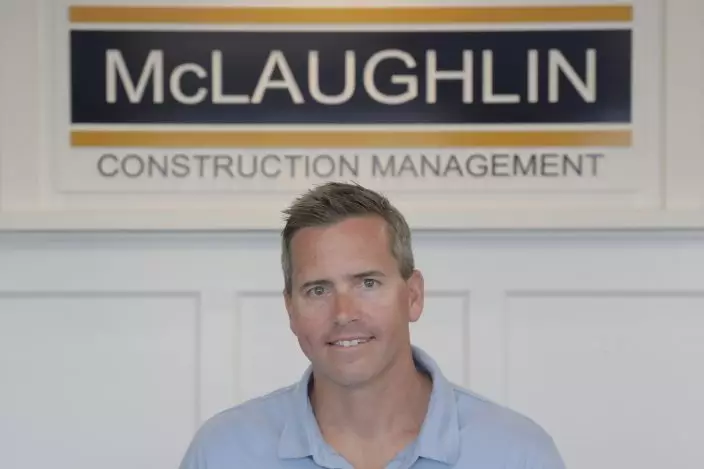
In this Wednesday, June 5, 2019, photo, Chris Carr, president of McLaughlin Construction Management, poses for a photo in Sea Isle City, N.J. When Jim McLaughlin died suddenly from a heart attack at age 64, his family assumed they would have to close his homebuilding business. But as McLaughlin’s son-in-law, Carr, started to wind down the Sea Isle City, New Jersey, company five years ago, he realized it was worth keeping open and that he, an accountant, should try to run it. (AP PhotoJulio Cortez)
Many small business owners have no plans for what will happen to their companies when they die. The spouses, children or other relatives who step into the breach have to quickly learn the business, sometimes after sorting through haphazard records, and, as Carr did, try to win the confidence of staffers and vendors.
Surveys taken by banks and insurance companies in recent years found that most owners haven't created what's known as a succession plan that provides for who will own and run a business after the owner's death. But even those who have plans may not have written them or communicated them to anyone — including their chosen successors.
"They don't want to think about it," says Jillyn Hess-Verdon, an attorney based in Newport Beach, California, who does estate and succession planning. "Most of my clients spend more time planning a two-week vacation than they do the succession of a business."
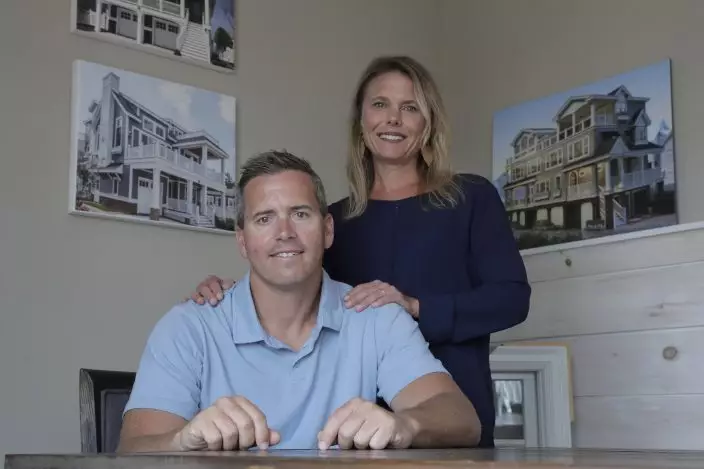
In this Wednesday, June 5, 2019, photo, Chris Carr, left, president of McLaughlin Construction Management, poses for a photo with his wife Kristy Carr in their office in Sea Isle City, N.J. When Kristy's father Jim McLaughlin died suddenly from a heart attack at age 64, his family assumed they would have to close his homebuilding business. But as McLaughlin’s son-in-law, Chris, started to wind down the Sea Isle City, New Jersey, company five years ago, he realized it was worth keeping open and that he, an accountant, should try to run it. (AP PhotoJulio Cortez)
At McLaughlin Construction, the transition was eased by the fact Jim McLaughlin kept good records. But as is the case at many small companies, he was the business; his personality and track record were what brought customers in. As Carr talked to employees and contractors, he got up to speed and ensured that the projects underway were completed. He then had to convince prospective customers he would deliver the same service and quality McLaughlin did. It took three years before he felt the business was back on the trajectory it had before McLaughlin's death.
Succession planning involves legal as well as practical issues, Hess-Verdon says. When there isn't a plan, family members can end up fighting over a company in court; the ensuing time, money spent and strife can distract from running the business. In partnerships, the battle can be between the family and the surviving partner or partners.
"It can be really damaging to the asset itself," Hess-Verdon says.
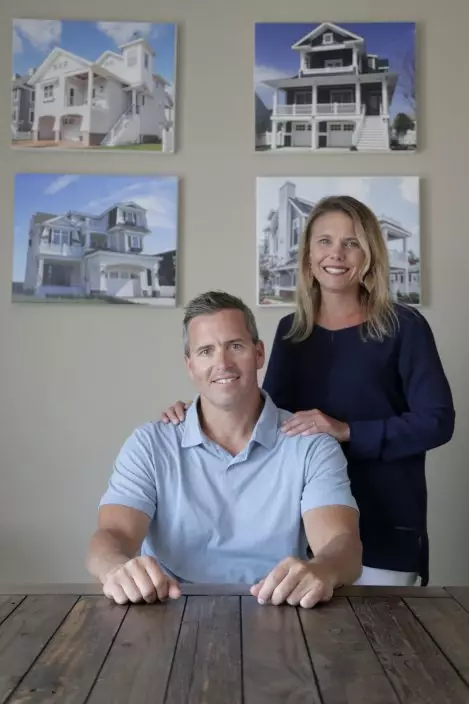
In this Wednesday, June 5, 2019, photo, Chris Carr, left, president of McLaughlin Construction Management, poses for a photo with his wife Kristy Carr in their office in Sea Isle City, N.J. When Kristy's father Jim McLaughlin died suddenly from a heart attack at age 64, his family assumed they would have to close his homebuilding business. But as McLaughlin’s son-in-law, Chris, started to wind down the Sea Isle City, New Jersey, company five years ago, he realized it was worth keeping open and that he, an accountant, should try to run it. (AP PhotoJulio Cortez)
The business can also suffer when practical matters aren't dealt with before a death. For example, if the person or people who take over the company's operations need to be licensed and aren't, legally they're not allowed to be running the business, Hess-Verdon says.
There can be unpleasant surprises. When Randy Hansen was about to have a bone marrow transplant as he fought leukemia, he wrote down some basic information about his agricultural business and gave it to his wife, Sandy. Hansen thought he'd be OK, but three months later, in January 2003, he died at the age of 34. Soon after, his wife discovered that AgVenture Feed & Seed was close to bankruptcy; there was a bad farming economy at the time and Hansen had just bought out his former partner, burdening the Watkins, Minnesota, company with debt.
"He was a typical entrepreneur who didn't have a lot of policies written down," Sandy Hansen-Wolff recalls. "I feel like I went on a daily journey, getting through the day, handling my grief and also figuring the company out."
Hansen-Wolff found herself in difficult conversations with bankers and vendors about the company's financial position. She would hear third-hand that some suppliers publicly expressed doubts about her ability to keep the company going, saying, "she'll never be able to do it." As part of her learning curve, Hansen-Wolff developed a strategy of staying tough.
"I told them, 'either you are working with us or you are working against us,'" she says. After about a year, the company was turning around.
Trying to access online accounts including social media can be a nightmare for someone trying to keep a company going after the owner's death.
David Lyon owned a publishing business that he used to sell his own engineering books. When he suddenly died from a heart attack in December 2017, his daughter Jen took over Raven Publishing Co., based in Pittsfield, Massachusetts. While David Lyon had left a binder with some important information, it didn't include the password to his email. Soon after his death, his social media accounts were hacked and Jen Lyon couldn't respond to requests from readers.
"That's a lot of how he got business — people reached him on LinkedIn," she says.
There were other problems. She had to search through his computer files to understand issues like keeping copyrights going and renewing her father's business licenses. In order to keep marketing the books, she had to learn where he sold them, and what he did to advertise them.
"It's a matter of a lot detective work," she says. "I wish I had an opportunity to have a conversation with him before he passed away."
Follow Joyce Rosenberg at www.twitter.com/JoyceMRosenberg . Her work can be found here: https://apnews.com .
UNITED NATIONS (AP) — The United States vetoed a widely backed U.N. resolution Thursday that would have paved the way for full United Nations membership for Palestine, a goal the Palestinians have long sought and Israel has worked to prevent.
The vote in the 15-member Security Council was 12 in favor, the United States opposed and two abstentions, from the United Kingdom and Switzerland. U.S. allies France, Japan and South Korea supported the resolution.
The strong support the Palestinians received reflects not only the growing number of countries recognizing their statehood but almost certainly the global support for Palestinians facing a humanitarian crisis caused by the war in Gaza, now in its seventh month.
The resolution would have recommended that the 193-member U.N. General Assembly, where there are no vetoes, approve Palestine becoming the 194th member of the United Nations. Some 140 countries have already recognized Palestine, so its admission would have been approved, likely by a much higher number of countries.
U.S. deputy ambassador Robert Wood told the Security Council that the veto “does not reflect opposition to Palestinian statehood but instead is an acknowledgment that it will only come from direct negotiations between the parties."
The United States has “been very clear consistently that premature actions in New York — even with the best intentions — will not achieve statehood for the Palestinian people,” deputy State Department spokesman Vedant Patel said.
His voice breaking at times, Palestinian U.N. Ambassador Riyad Mansour told the council after the vote: “The fact that this resolution did not pass will not break our will and it will not defeat our determination.”
“We will not stop in our effort,” he said. “The state of Palestine is inevitable. It is real. Perhaps they see it as far away, but we see it as near.”
This is the second Palestinian attempt for full membership and comes as the war in Gaza has put the more than 75-year-old Israeli-Palestinian conflict at center stage.
Palestinian President Mahmoud Abbas first delivered the Palestinian Authority’s application for U.N. membership in 2011. It failed because the Palestinians didn’t get the required minimum support of nine of the Security Council’s 15 members.
They went to the General Assembly and succeeded by more than a two-thirds majority in having their status raised from a U.N. observer to a non-member observer state in 2012. That opened the door for the Palestinian territories to join U.N. and other international organizations, including the International Criminal Court.
Algerian U.N. Ambassador Amar Bendjama, the Arab representative on the council who introduced the resolution, called Palestine’s admission “a critical step toward rectifying a longstanding injustice" and said that “peace will come from Palestine’s inclusion, not from its exclusion.”
In explaining the U.S. veto, Wood said there are “unresolved questions” on whether Palestine meets the criteria to be considered a state. He pointed to Hamas still exerting power and influence in the Gaza Strip, which is a key part of the state envisioned by the Palestinians.
Wood stressed that the U.S. commitment to a two-state solution, where Israel and Palestine live side-by-side in peace, is the only path for security for both sides and for Israel to establish relations with all its Arab neighbors, including Saudi Arabia.
“The United States is committed to intensifying its engagement with the Palestinians and the rest of the region, not only to address the current crisis in Gaza, but to advance a political settlement that will create a path to Palestinian statehood and membership in the United Nations,” he said.
Mansour, the Palestinian U.N. ambassador, reiterated the commitment to a two-state solution but asserted that Israel believes Palestine "is a permanent strategic threat."
"Israel will do its best to block the sovereignty of a Palestinian state and to make sure that the Palestinian people are exiled away from their homeland or remain under its occupation forever,” he said.
He demanded of the council and diplomats crowded in the chamber: “What will the international community do? What will you do?”
Israeli-Palestinian negotiations have been stalled for years, and Israel’s right-wing government is dominated by hard-liners who oppose Palestinian statehood.
Israeli U.N. Ambassador Gilad Erdan called the resolution “disconnected to the reality on the ground” and warned that it “will cause only destruction for years to come and harm any chance for future dialogue.”
Six months after the Oct. 7 attack by the Hamas militant group, which controlled Gaza, and the killing of 1,200 people in “the most brutal massacre of Jews since the Holocaust,” he accused the Security Council of seeking “to reward the perpetrators of these atrocities with statehood.”
Israel’s military offensive in response has killed over 32,000 Palestinians, according to Gaza’s health ministry, and destroyed much of the territory, which speaker after speaker denounced Thursday.
After the vote, Erdan thanked the United States and particularly President Joe Biden “for standing up for truth and morality in the face of hypocrisy and politics.”
He called the Palestinian Authority — which controls the West Bank and the U.S. wants to see take over Gaza where Hamas still has sway — “a terror supporting entity.”
The Israeli U.N. ambassador referred to the requirements for U.N. membership – accepting the obligations in the U.N. Charter and being a “peace-loving” state.
“How can you say seriously that the Palestinians are peace loving? How?” Erdan asked. “The Palestinians are paying terrorists, paying them to slaughter us. None of their leaders condemns terrorism, nor the Oct. 7 massacre. They call Hamas their brothers.”
Despite the Palestinian failure to meet the criteria for U.N. membership, Erdan said most council members supported it.
“It’s very sad because your vote will only embolden Palestinian rejectionism every more and make peace almost impossible,” he said.
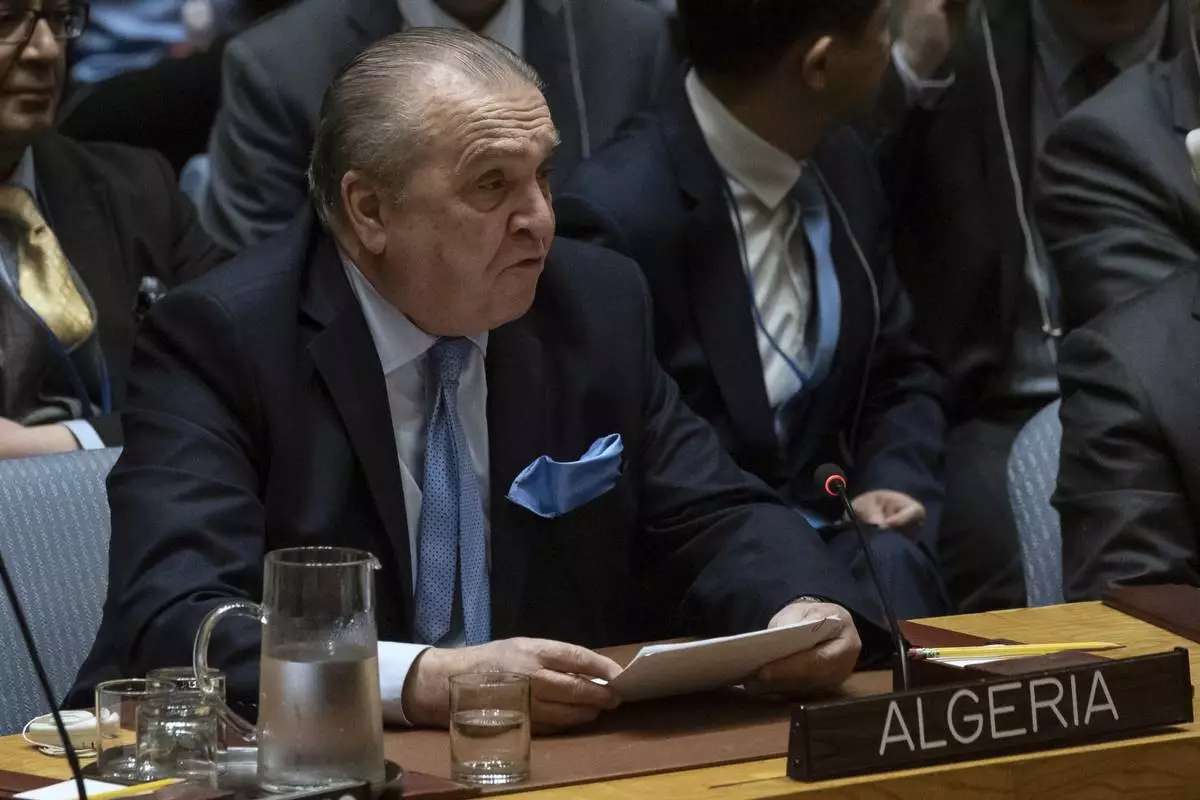
Algeria's Permanent Ambassador to the United Nations Amar Bendjama speaks during a Security Council meeting at United Nations headquarters, Thursday, April 18, 2024. (AP Photo/Yuki Iwamura)
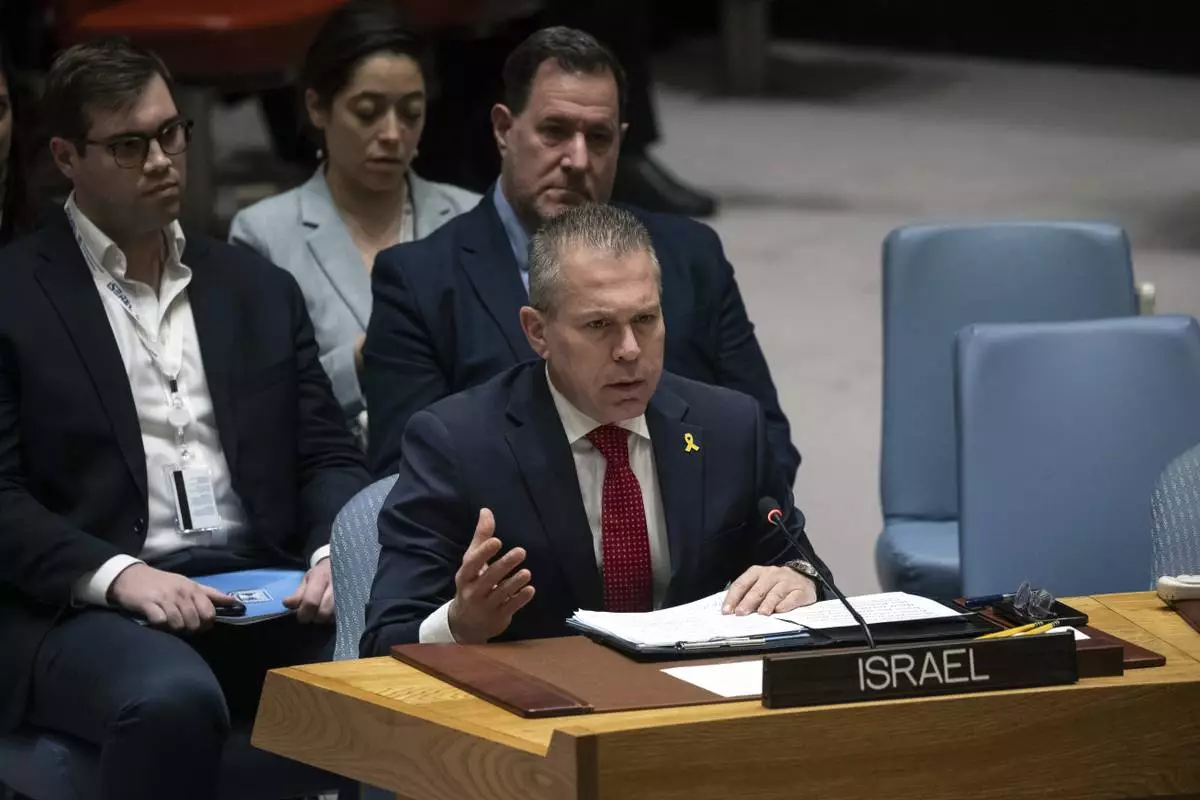
Israeli Ambassador to the United Nations Gilad Erdan speaks during a Security Council meeting at United Nations headquarters, Thursday, April 18, 2024. (AP Photo/Yuki Iwamura)
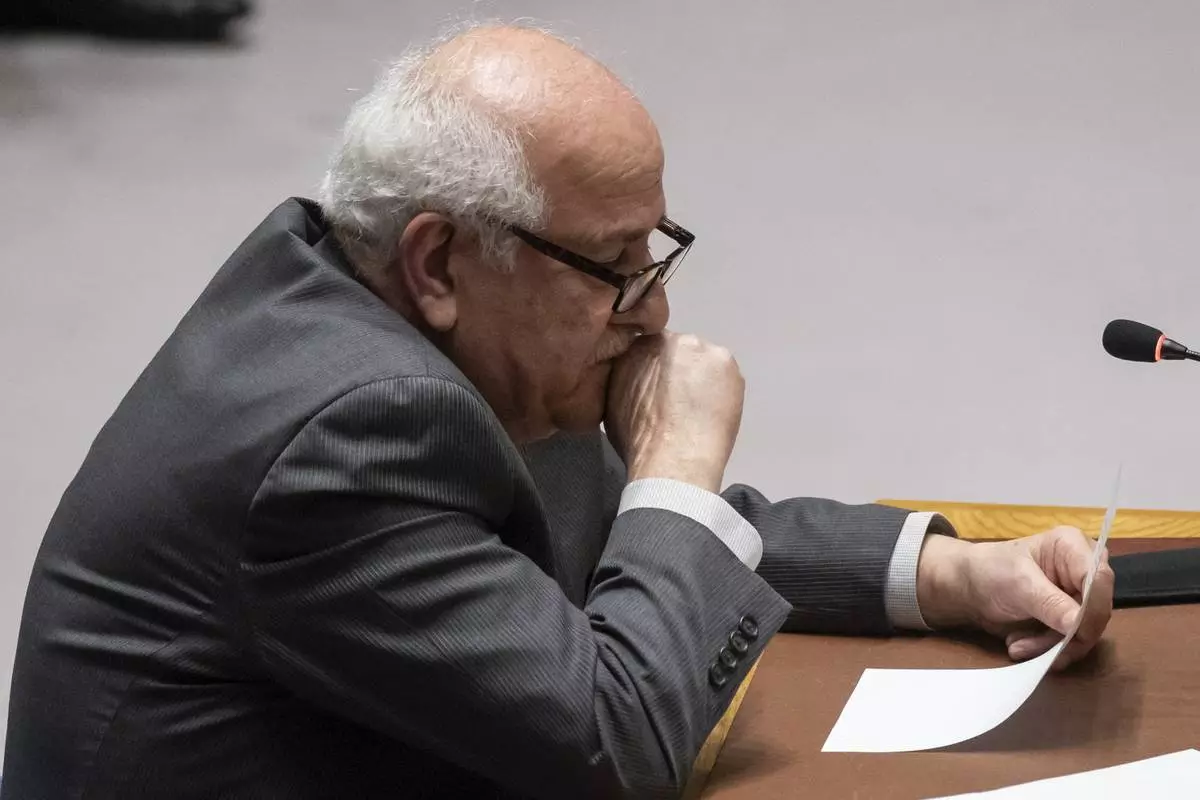
Palestinian Ambassador to the United Nations Riyad Mansour holds tears while speaking during a Security Council meeting at United Nations headquarters, Thursday, April 18, 2024. (AP Photo/Yuki Iwamura)
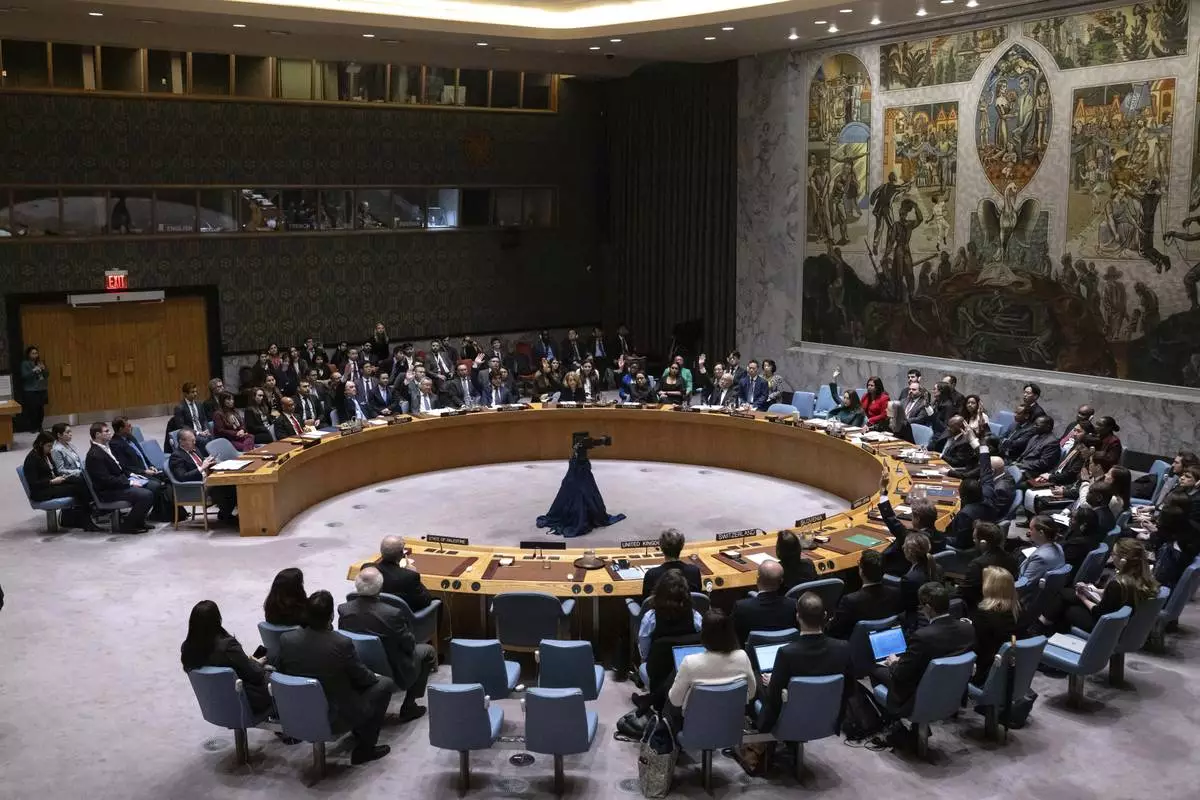
Representatives of member countries take votes during a Security Council meeting at United Nations headquarters, Thursday, April 18, 2024. (AP Photo/Yuki Iwamura)

Palestinian Ambassador to the United Nations Riyad Mansour, left, and United Nations Secretary-General Antonio Guterres speak before a Security Council meeting at the United Nations headquarters, Thursday, April 18, 2024. (AP Photo/Yuki Iwamura)
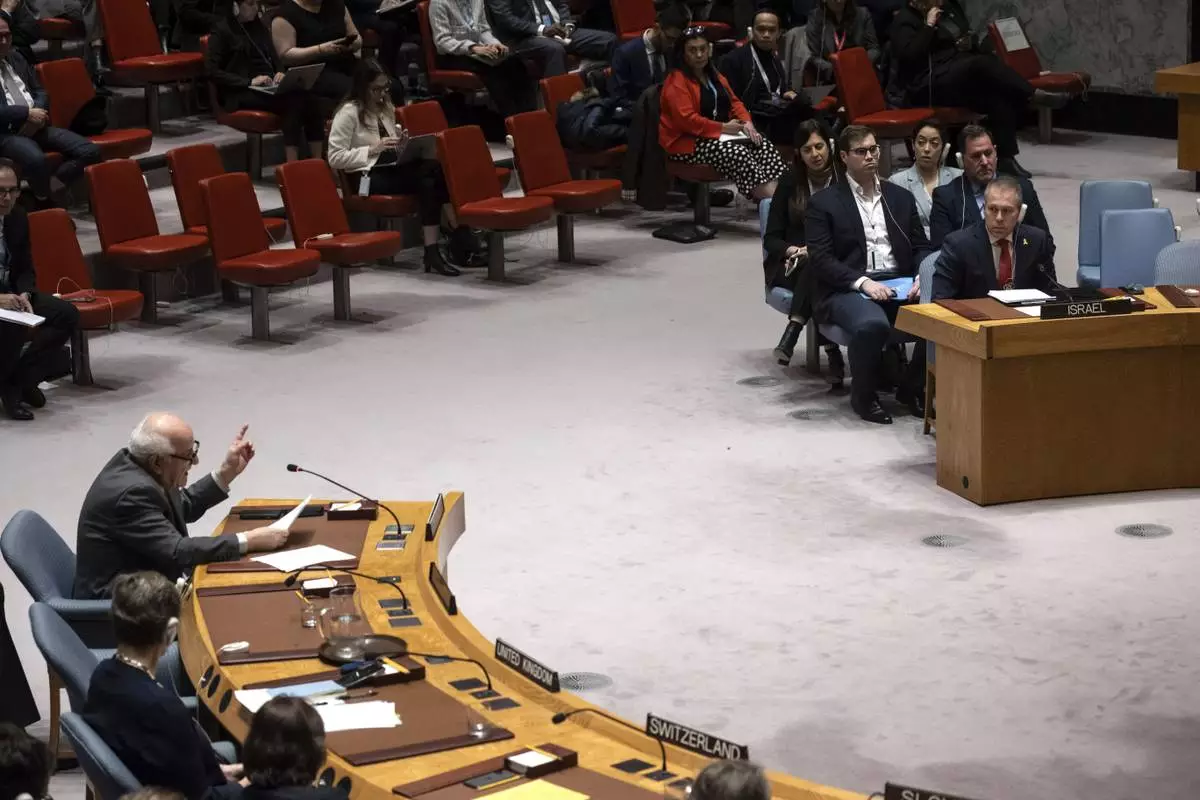
Palestinian Ambassador to the United Nations Riyad Mansour speaks during a Security Council meeting at United Nations headquarters, Thursday, April 18, 2024. (AP Photo/Yuki Iwamura)
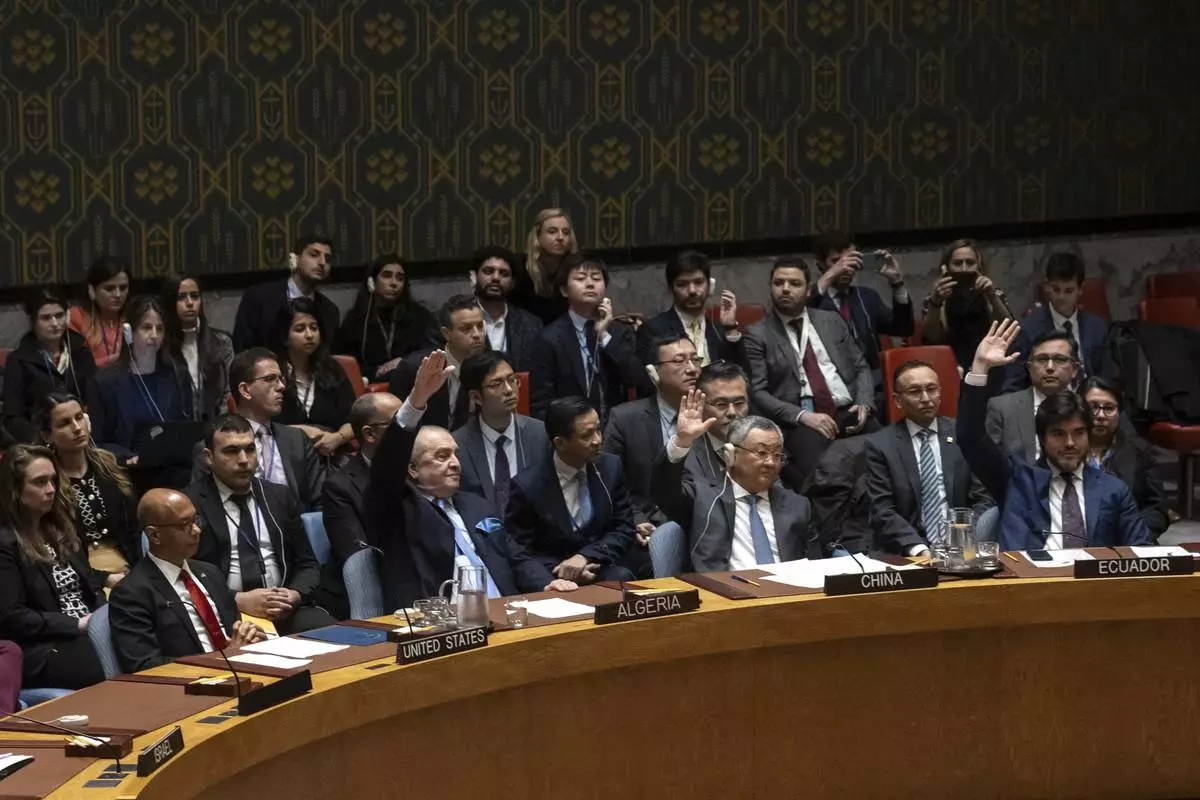
Representatives of member countries take votes during a Security Council meeting at United Nations headquarters, Thursday, April 18, 2024. (AP Photo/Yuki Iwamura)
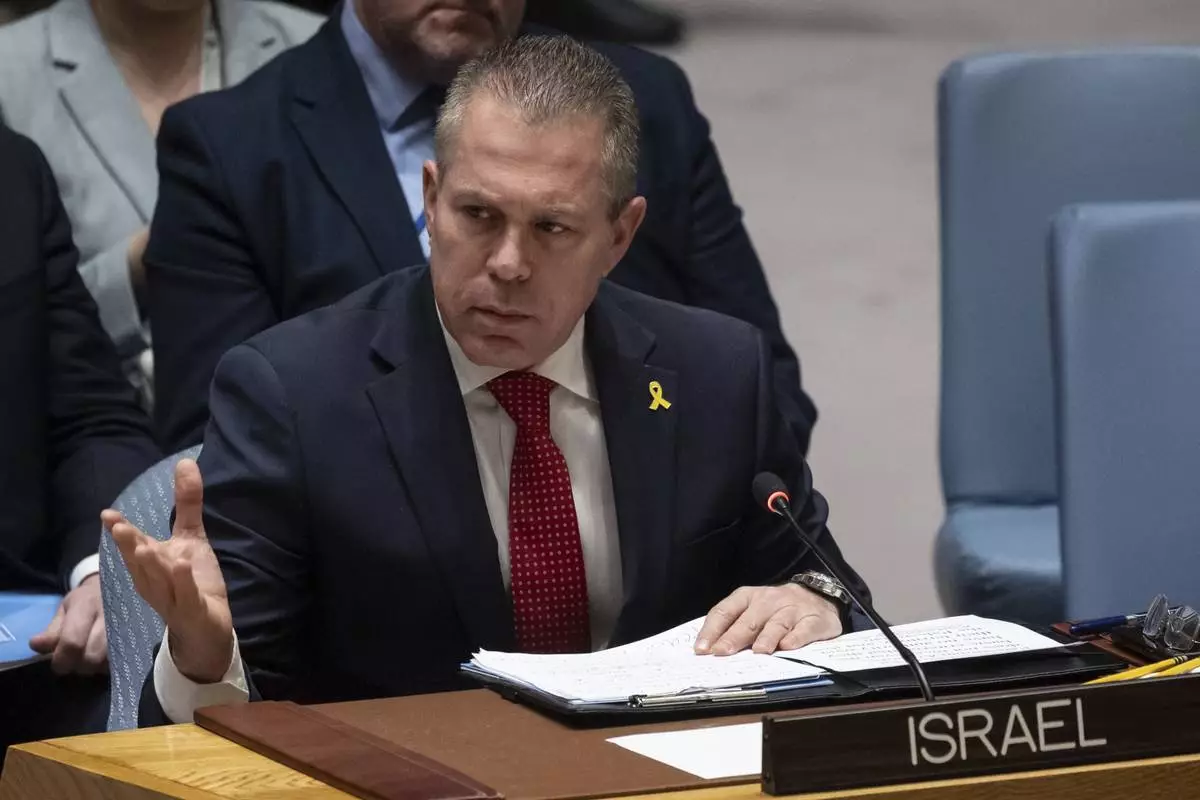
Israeli Ambassador to the United Nations Gilad Erdan speaks during a Security Council meeting at United Nations headquarters, Thursday, April 18, 2024. (AP Photo/Yuki Iwamura)
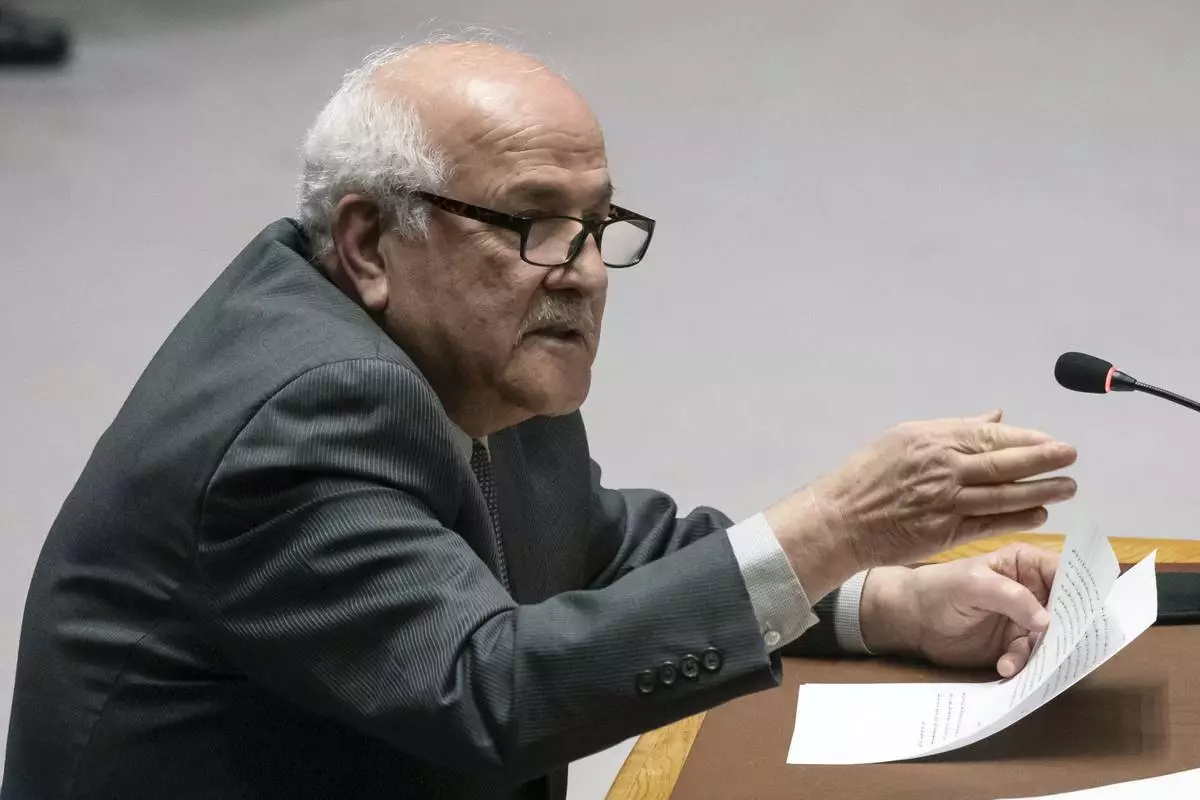
Palestinian Ambassador to the United Nations Riyad Mansour speaks during a Security Council meeting at United Nations headquarters, Thursday, April 18, 2024. (AP Photo/Yuki Iwamura)
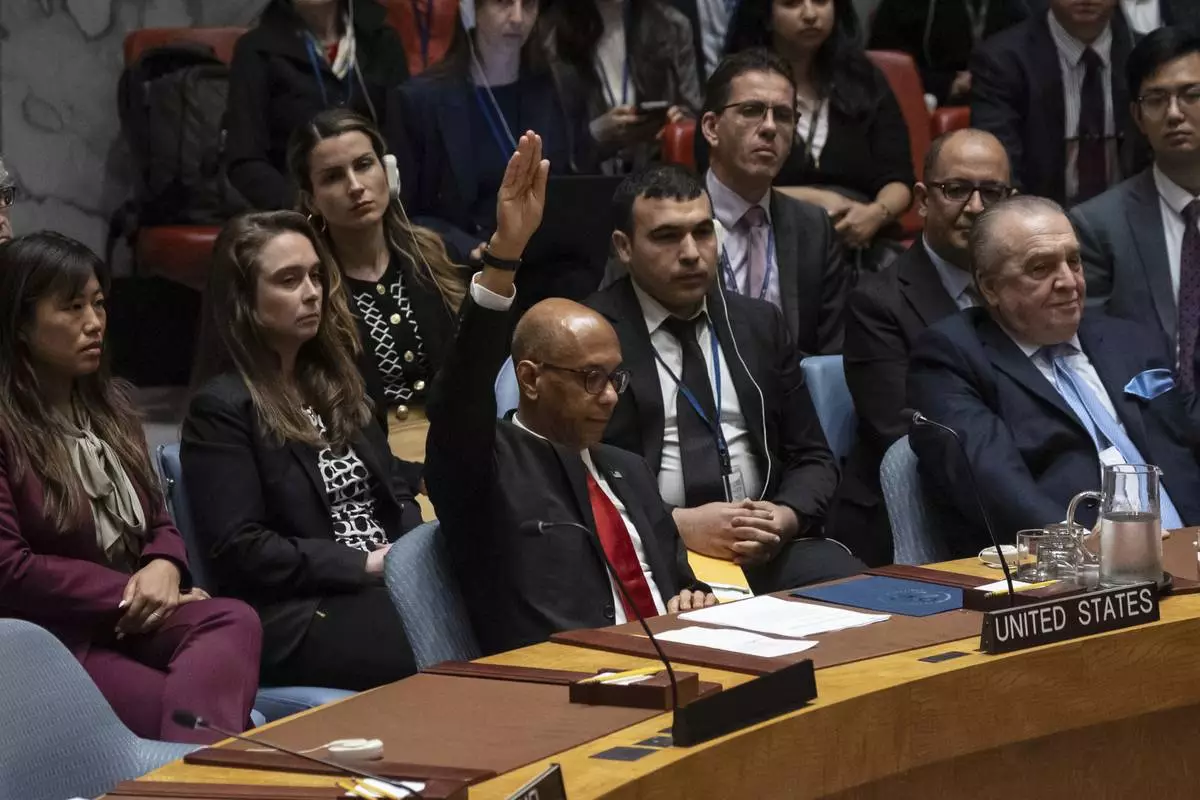
U.S. Deputy Ambassador Robert Wood votes against resolution during a Security Council meeting at United Nations headquarters, Thursday, April 18, 2024. (AP Photo/Yuki Iwamura)






















